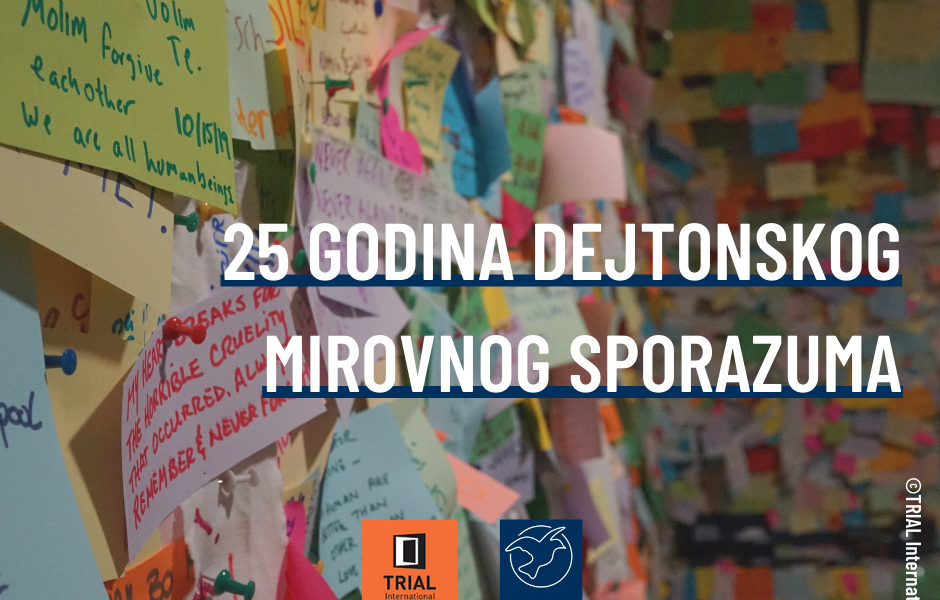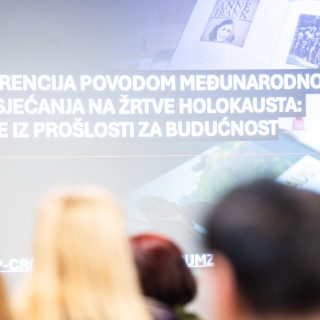The General Framework Agreement for Peace in Bosnia and Herzegovina, better known as the Dayton Peace Agreement, was signed on 21 November 1995. At a time when war was raging in a country where horrific crimes were committed – genocide, ethnic cleansing, rape, mass executions, torture, camps and other places of detention – an entire spectre of all possible war crimes and crimes against humanity, the end of war was the first thing that comes to mind in relation to the BiH peace agreement. The situation is the same even 25 years later, however, we now have the experience of living in Dayton peace.
In addition to ending the war, the Dayton Peace Agreement established a state, complex and expensive, whereas the post-conflict period showed to what extent have the Dayton principles – in the pursuit of a compromise peace – complicated and impacted the dealing with the recent, difficult past. The commenced processes of social, economic and political transition are still ongoing, while, in parallel, ethnic collectives have been built and empowered – those that keep the keys to peacebuilding and the European future. We often hear that our peace agreement has in fact frozen the conflict. The Constitution, contained in Annex 4, marginalised the citizen and introduced ethnic communities as right-holders. Over the last 25 years, we have learned that it is very difficult, almost impossible, to conduct institutional, constructive dealing with the past based on court established facts, to establish peace and rule of democracy with the same actors, politics, ideology, divisions that served as foundations of the war and that now come packaged as constitutional categories of ‘constituency’, ‘vital national interest’, ‘parity’. The insistence on the importance of ethnic politics and national parties is not only the result of the state structure, but also a consequence of war and war ideologies. The rapid rise of ethnic identity has drawn boundaries on all sides, establishing new spaces in which citizens are only an individual category and war victims and survivors are forgotten, inconsequential and side-lined, important only during election campaigns. State and entity building thus becomes the mainstream topic of political discourse, which uses the war past for revisionism, manipulation and construction of parallel memories. The consequences of the war on the population become only an unpleasant side fact, an alternative discourse of the civil sector.
Peacebuilding in BiH is found between transitional justice and the Dayton principles. For many years, transitional justice work has primarily focused on the judicial response to crimes committed during the war. Criminal prosecution of war criminals entails establishment of responsibility and facts on crimes committed, including acknowledgment of the suffering of victims and their families. These processes were to lead to dealing with the past and encourage peacebuilding. Although some positive developments have taken place, progress is slow and, according to the current prosecution rate, there are concerns that our judicial institutions will fail to meet the deadline for finalising all war-related cases by 2023. For the tired and forgotten victims, this denial of justice increases their suffering and, unfortunately, many will not live to see justice. There is rarely an understanding of protracted consequences of war: they do not end with the end of war and the position of victims in this country is extremely degrading. The victims of war are thus in a two-fold disadvantage – primarily due to harm suffered, but also due to the inability to exercise their rights.
The United Nations Committee against Torture adopted a decision in 2019 concerning a complaint of a victim, which stipulates that BiH should pay compensation for the damage suffered and provide public apology to the survivor of wartime sexual violence, as well as enable full rehabilitation. In 2020, the UN Committee on the Elimination of Discrimination against Women adopted its first decision against BiH, confirming that gender-based violence against women is a form of discrimination and torture. This is the first decision to hold BiH accountable, as well as the first one to acknowledge the sufferings of survivors of sexual violence. At the same time, this, as well as other steps towards peacebuilding, are largely the result of the commitment of civil society organisations, human rights activists and individuals whose activism seeks to normalise the relations between people and communities. Instead of having the institutions care for the rights of these vulnerable categories, the victims are forced to rely on civil society organisations in their struggle for rights and support. Decisions like these are evidently necessary to awaken state accountability, but we must ask – how many victims will live to see this form of justice?
Dealing with the past is a process that requires time and systematic, objective and continuous work. Nevertheless, our collective memory is structured to correspond to the Dayton peace – three peoples, three collective memories, mutually conflicting and exclusive. Denial of court-established war crimes or their glorification or the glorification of those who committed them is ubiquitous, whereas the competent institutions still lack the ‘political will’ to adopt a regulation to stop this practice or to take some other concrete institutional steps. The current nationalist political environment and the lack of adequate regulation encourages political elites to manipulate the established facts and use them for their political goals, thus hindering the process of dealing with the past and undermining peacebuilding. It seems that a responsible attitude towards the past, which very much shapes our present, is not part of programmes of leading political parties or their will. At the same time, we still have collective centres, a difficult process of achieving any form of reparation, attacks on returnees, dependence on external aid and intervention. Meeting the goals of transitional justice requires sanctioning and regulating the contestation and denial of court decisions in war crime cases. The failure to punish the perpetrators, but also their glorification, not only hurts the victims repeatedly, but leads to further social divisions and prevents state and society building on the foundations of the rule of law and democratic principles.
In BiH, we see a political instrumentalisation of memory. Instead of having a healing effect on communities and serving as places where respect and grief are shown for the victims, places of remembrance, memorials and commemorative practices in BiH are often used for ethnic demarcations in divided communities. Therefore, not only that they fail to contribute to coping with losses and understanding of what has happened in the past – they serve to solidify old and create new divisions. Our practice has shown that we use monuments not only to mark the version of the truth we would like to remember, we also delete those elements from the past that we would like to forget. The resistance to the construction of the monument to the killed children of Prijedor or the commemoration of the civilians killed in Kazani in Sarajevo are examples of ignoring the suffering of those outside the majority ethnic group. Negative memory means self-critical, public remembrance of crimes committed by one’s own state or one’s own socio-political group – which is rare or non-existent in our case.
Educational institutions and the media have been transformed into instruments for implementing divisions and institutionalising conflicting discourses about the past. The curricula are either silent on the 1990s war or they include different, ethnically-mythologically coloured interpretations of the past. Two schools under one roof might be the best illustration of the BiH reality: next to each other, but not with each other. The physical and ideological separation of students by ethnicity speaks volumes about the commitment and will to build peace.
The BiH authorities have not yet adopted a Transitional Justice Strategy, nor have they resolved comprehensively the issue of victims of wartime torture, reformed the education system or prohibited the denial, condonation, or glorification of crimes and criminals. The Dayton BiH did not succeed in building itself as a self-sustainable state governed by a reform-oriented political force. We need to be aware of that – our peace process is far from successful and BiH is in a situation of a “captured state”. The survivors of war, but also other BiH citizens, are losing hope and faith in the state and institutions; combined with the ubiquitous manipulations of the war past, life here can really be reduced to the local saying: ‘it’s fine as long as they don’t shoot’. This takes us back to the beginning of this text – the year 1995 – did the Dayton Peace Agreement exhaust its reach in stopping the war in BiH?
We certainly do not wish to repeat that not enough has been done for peacebuilding in BiH on every next anniversary of the Dayton Peace Agreement. The fragile and limited achievements of Dayton today might be either undermined or enhanced by the EU integration requirements the state needs to meet through various reforms. The EU integration process is a significant opportunity for BiH to improve the existing situation, as the issue of dealing with the past is key in this process. Rule of law is an imperative, not a technicality, as is the prosecution, exercise of the victims’ rights and the right to justice and truth by respecting court decisions in the BiH practice. It is clear that the status quo resulting, inter alia, from the Dayton Agreement, is not a solution as are the messages to BiH authorities saying that there is no place in the EU for states that deny war crimes and that revisionism and denial are contrary to the fundamental European values.
These messages emphasise that it is high time to build a state based on the rule of law principles, democratic values and respect for the judiciary as the pillar of democratic societies and, finally, on the path of Bosnia and Herzegovina towards the European integration. Therein lies the responsibility and necessity of state, international and civilian action.
The Dayton Peace Agreement, in addition to ending the war, alienated peace from Bosnia and Herzegovina. With the understanding that this was not its goal and with the experience of its implementation, we must think responsibly about our future. War narratives are not only present but on the rise, and they cause tension in every segment of post-conflict life. There is still no clear will on the part of institutions to face the grave consequences of past human rights violations. Entire generations of young people in BiH have grown up in divisions and hatred. That is the only reality they know. If you take a closer look, preventing all of the above should have been the goal of the peace agreement. It can still be, but that requires a strong shift and taking responsibility in understanding the process of dealing with the past within BiH at all legislative, institutional, educational levels, and more active and decisive politics and influence, both local and international.
The direction of institutional dealing with the past and peacebuilding in Dayton BiH must be based on established facts (judgments of national and international courts) instead of their interpretation, denial or abuse, including in educational institutions, public spaces, the media, political discourses. We need to apply the ‘lessons learned’ in the previous 25 years in the approach to dealing with the past, preventing politicisation of the process especially in terms of denying, trivialising, condoning or approving genocide, crimes against humanity or war crimes. Regulation of this field is necessary, which sends a strong message of the commitment of society and state to establish the rule of law and overcome the past. At the same time, victims must see that their right to justice, truth and reparations is fully enforced. We remind that changes in society are necessary, in addition to formal changes in policies, laws and processes. Denial and revisionism in cases of war crimes, as well as glorification and commemoration of convicted war criminals are contrary to fundamental European values.
How much longer do we have to wait for BiH officials to stop the above practices and the systematic blocking of democratic development of the state and society, especially given EU integration as a chance to overcome the narrowly interpreted and underused opportunities to deal with the past?
The text was created in cooperation between forumZFD, TRIAL International, and legal expert Lejla Gačanica.




